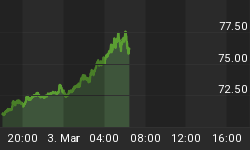As the evening developed, and it began to dawn on Americans - and the world - that Donald Trump might actually win, markets plunged. The S&P was down 100 points before midnight; the dollar index was off 2%. Gold rose about $70; 10-year yields rose 15bps. Nothing about that was surprising. Lots of people predicted that if Trump somehow won, markets would gyrate and move in something close to this way. If Clinton won, the 'status quo' election would mean much calmer markets.
So, we got the upset. Despite the hyperbole, it was hardly a "stunning" upset.[1] Going into yesterday, the "No Toss Ups" maps had Trump down about 8 electoral votes. Polls in all of the "battleground" states were within 1-2 points, many with Trump in the lead. Yes, the "road to victory" was narrow, requiring Trump to win Florida, Ohio, North Carolina, and a few other hotly-contested battlegrounds, but no step along that road was a long shot (and it wasn't like winning 6 coin flips, because these are correlated events). Trump's victory odds were probably 20%-25% at worst: long odds, but not ridiculous odds. (And I believe the following wind to Trump from the timing of Obamacare letters was underappreciated; I wrote about this effect on October 27th).
And yet, stock markets in the two days prior to the election rose aggressively, pricing in a near-certainty of a Clinton victory. Again, recall that pundits thought that a Clinton victory would see little market reaction, but a violent reaction could obtain if Trump won. Markets, in other words, were offering tremendous odds on an event that was unlikely, but within the realm of possibility. The market was offering nearly-free options. The same thing happened with Brexit: although the vote was close to a coin-flip, the market was offering massive odds on the less-likely event. Here is an important point as well - in both cases, the error bars had to be much wider than normal, because there were dynamics that were not fully understood. Therefore, the "out of the money" outcome was not nearly as far out of the money as it seemed. And yet, the market paid you handsomely to be short markets (or less long) before the Brexit vote. The market paid you handsomely to be short markets (or less long) before yesterday's election results were reported. And, patting myself on the back, I said so.

This is not a political blog, but an investing blog. And my point here about investing is simple: any competent investor cannot afford to ignore free, or nearly-free, options. Whatever you thought the outcome of the Presidential election was likely to be, it was an investing imperative to lighten up longs (at least) going into the results. If the status-quo happened, you would not have lost much, but if the status quo was upset, you would have gained much. As I've been writing recently about inflation breakevens (which was also a hard-to-lose trade, though less dramatic), the tail risks were really underpriced. Investing, like poker, is not about winning every hand. It is about betting correctly when the hand is played.
At this hour, stock markets are bouncing and bond markets are selling off. These next moves are the difficult ones, of course, because now we all have the same information. I suspect stocks will recover some, at least temporarily, because investors will price a Federal Reserve that is less likely to tighten and the knee-jerk response is to buy stocks in that circumstance. But it is interesting that at the moment, while stocks remain lower the bond market gains have completely reversed and are turning into a rout. 10-year inflation breakevens are wider by about 9-10bps, which is a huge move. But there will be lots of gyrations from here. The easy trade was the first one.
[1] And certainly not "the greatest upset in American political history." Dewey Defeats Truman, anyone?
















